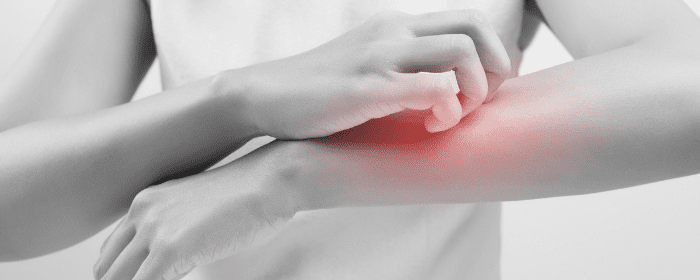Atopic dermatitis, better known as eczema, is a chronic, itchy skin disease. People with eczema have chronically dry skin, often in patches, that can be intensely itchy. The patches of atopic dermatitis vary from red bumps (papules or vesicles) when they are inflamed, to dry, scaly, pink areas when they are not inflamed. Patients with eczema itch so frequently that the skin in the lesion can thicken and harden, a process called lichenification. Even patients who manage to clear the lesions usually have a recurrence (i.e. the itchy patches come back).
Patients with eczema can try lotion and moisturizers to soften the skin and reduce itchiness, but these are only helpful temporality and only seem to work for people with mild disease. Often, topical corticosteroids are required. Steroids are applied to areas of atopic dermatitis to reduce inflammation and itchiness. In severe cases where steroids are not fully helpful, light therapy (phototherapy) may be needed. Patients may require more intense therapy for atopic dermatitis such as cyclosporine, methotrexate, azathioprine, mycophenolate mofetil, or dupilumab. These medications have their own set of side effects, so they are reserved for people with severe, chronic eczema. Certainly better, safer treatments for atopic dermatitis are needed.
To this end, researchers conducted the first of its kind study to answer whether exosomes retrieved from mesenchymal stem cells taken from human adipose tissue (i.e. fat tissue) could relieve symptoms of atopic dermatitis in laboratory mice. Mice with experimental atopic dermatitis have similar symptoms to humans with the disease; they have itchy, red lesions that cause the skin to thicken. In the research study, treatment with stem cell-derived exosomes significantly improved the clinical score in these mice. In other words, stem cell exosome treatment reduced redness, swelling, scaling, dryness, and itching. Exosome treatment also reduced objective signs of inflammation including inflammatory cytokines (TNF, IL4, etc.), inflammatory antibodies (IgE), and inflammatory cells (eosinophils).
These results indicate that treatment with stem cell-derived exosomes substantially reduced symptoms in mice with atopic dermatitis. Of course, this work needs to be replicated in humans, but this important work lays the foundation for future clinical trials.
Reference: Cho, BS. et al. (2018). Exosomes derived from human adipose tissue-derived mesenchymal stem cells alleviate atopic dermatitis. Stem Cell Research & Therapy. 2018, Jul 11;9(1):187.


 St. Petersburg, Florida
St. Petersburg, Florida
